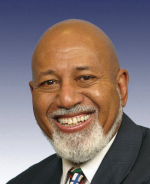 In 1981, Hastings was charged with accepting a $150,000 bribe in exchange for a lenient sentence and a return of seized assets for 21 counts of racketeering by Frank and Thomas Romano, and of perjury in his testimony about the case. He was acquitted by a jury after his alleged co-conspirator, William Borders, refused to testify in court (resulting in a jail sentence for Borders). In 1981, Hastings was charged with accepting a $150,000 bribe in exchange for a lenient sentence and a return of seized assets for 21 counts of racketeering by Frank and Thomas Romano, and of perjury in his testimony about the case. He was acquitted by a jury after his alleged co-conspirator, William Borders, refused to testify in court (resulting in a jail sentence for Borders).
In 1988, the Democratic-controlled U.S. House of Representatives took up the case, and Hastings was impeached for bribery and perjury by a vote of 413-3. Voters to impeach included Democratic Representatives Nancy Pelosi, Steny Hoyer, John Conyers and Charles Rangel. He was then convicted in 1989 by the United States Senate, becoming the sixth federal judge in the history of the United States to be removed from office by the Senate. The vote on the first article was 69 for and 26 opposed, providing five votes more than the two-thirds of those present that were needed to convict. The first article accused the judge of conspiracy. Conviction on any single article was enough to remove the judge from office. The Senate vote cut across party lines, with Senator Patrick J. Leahy, Democrat of Vermont voting to convict his fellow party member, and Arlen Specter voting to acquit.
The Senate had the option to forbid Hastings from ever seeking federal office again, but did not do so. Alleged co-conspirator, attorney William Borders went to jail again for refusing to testify in the impeachment proceedings, but was later given a full pardon by President Bill Clinton on his last day in office.
Hastings filed suit in federal court claiming that his impeachment trial was invalid because he was tried by a Senate committee, not in front of the full Senate, and that he had been acquitted in a criminal trial. Judge Stanley Sporkin ruled in favor of Hastings, remanding the case back to the Senate, but stayed his ruling pending the outcome of an appeal to the Supreme Court in a similar case regarding Judge Walter Nixon, who had also been impeached and removed.
Sporkin found some "crucial distinctions" between Nixon's case and Hastings', specifically, that Nixon had been convicted criminally, and that Hastings was not found guilty by two-thirds of the committee who actually "tried" his impeachment in the Senate. He further added that Hastings had a right to trial by the full Senate.
The Supreme Court, however, ruled in Nixon v. United States that the federal courts have no jurisdiction over Senate impeachment matters, so Sporkin's ruling was vacated and Hastings' conviction and removal were upheld.
Back to Rep. Alcee Hastings FEMA Camps Authorization Bill
|